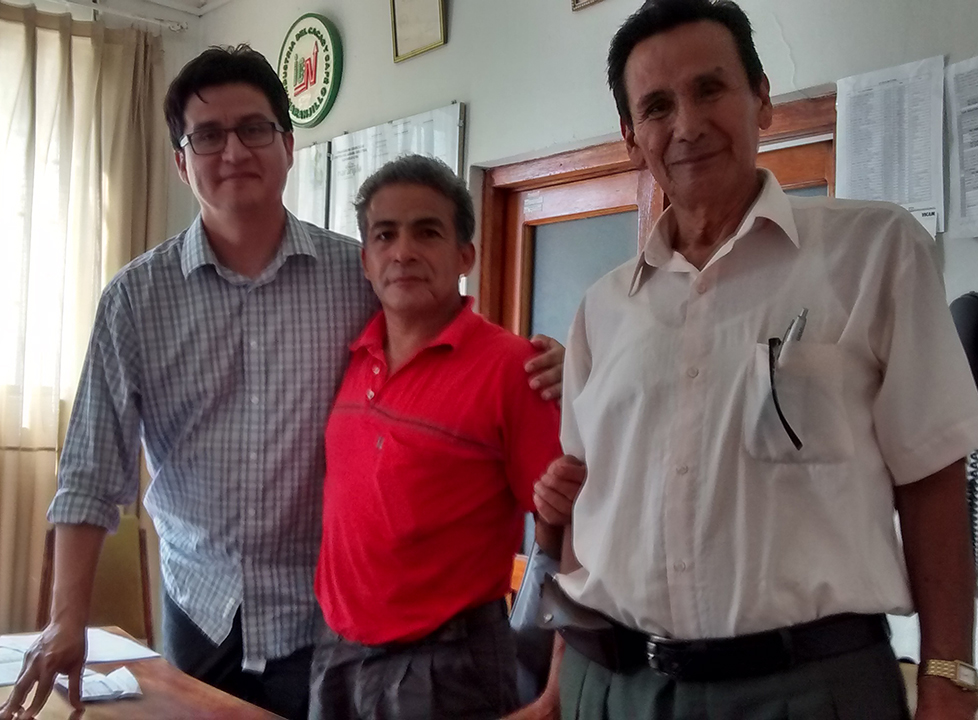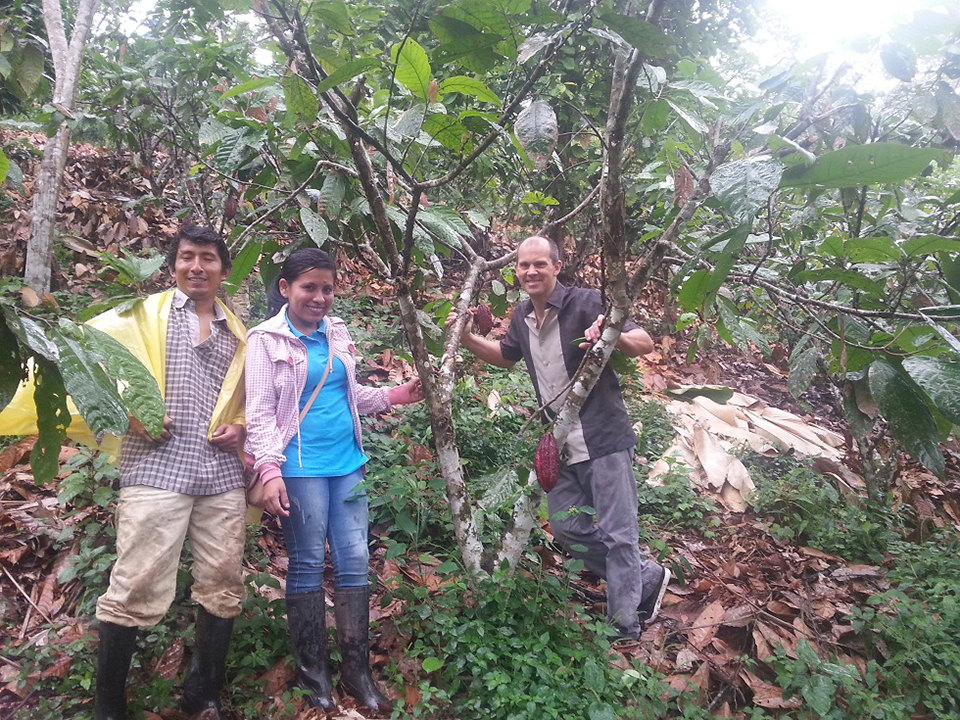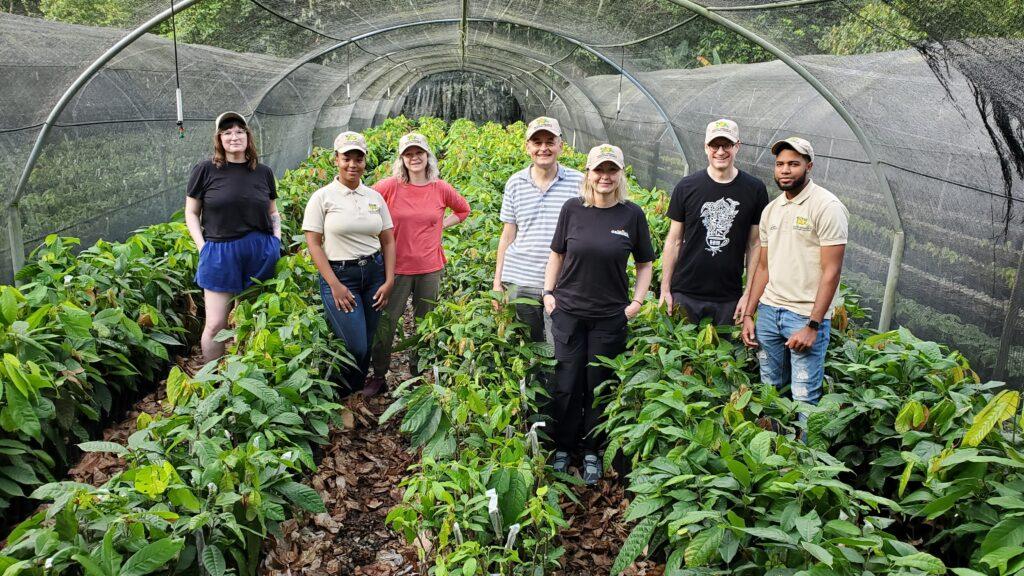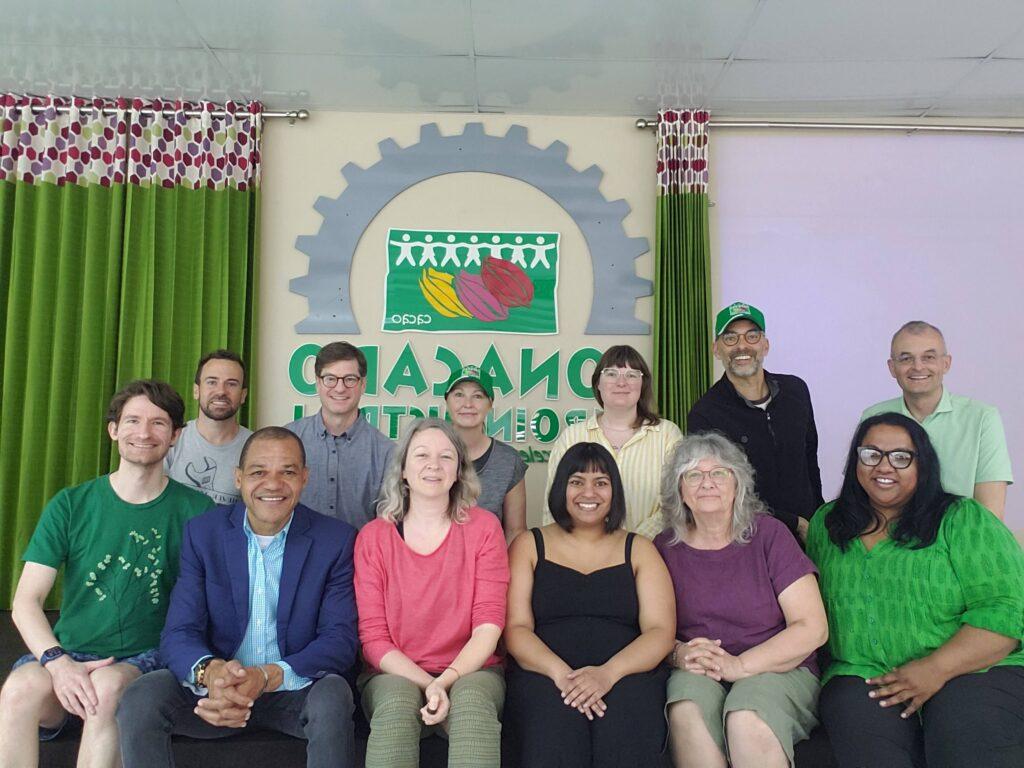“My uncle was a founder, member number 3,” began Marcos Casto, the newly elected President of the Board of Directors of Naranjillo Cooperative in Peru. He continued, “Yes, number 3, and I am the son of member #29. I’m member # 3712, so that tells you a lot about how long our co-operative has been around and how big it is.” Mr. Castro is telling his family story to La Siembra’s General Manager, Tom Hanlon Wilde, and Purchasing Manager Renato Sobrino during their visit in May. Mr.Castro farms the land his father farmed, 4 hectares of coffee trees interspersed with shade trees and oranges in the San Isidro region, ten kilometers from the city of Tingo Maria in central Peru.

Renato Sobrino of La Siembra with Marcos Castro and Florencia Valeueta of Naranjillo pause while discussing co-operation among co-operatives.
“People said cocoa wouldn’t work here,” said Naranjillo’s youngest Board member Mr. Revelinho, “but I had a feel. The soil is good. So I planted this hectare of cocoa ten years ago and it has turned out nicely. You can see the trees are planted two metres by three metres. I just harvest about a week and a half ago and then went through and pruned all the trees. Had to do everything myself, as it is difficult to find hired labour nowadays. The pruned branches I will leave there for a bit longer, then I’ll collect the wood but the leaves will decompose to fertilize the trees.”
The young Mr. Revenelino continued his tour, “That shade tree is good for fertilizing – a guava tree. And in this part I kept the mandarin orange trees because they are tasty. Here, I’ll climb up and get you some.”
Co-operativa Agraria Industrial Naranjillo was founded in 1964 by 32 farmer members who were pioneers in rural development in the Tingo Maria area and sought an alternative to the predatory practices of private traders who paid low prices for their products. Founding Board President Leoncio Lescano Alva and founding Oversight Committee Chair Victor Reyes Roca, helped lead the co-operative to incorporate coffee and cocoa farming members from throughout the rich, fertile agricultural lands of Huanuco, San Martin and Ucayali. The organization survived through the economic and political chaos, helping member families recover from the armed insurgents and narcotic traffickers who attempted to invade the region in the 1980s and 1990s, and has been a leading co-operative voice in Peru. In 1974 the co-op began the process of opening its first processing plant, which finally opened in 1985 and was expanded in 2014.

Naranjillo farmer member Sr. Revelino, agronomist Viviana, and La Siembra’s Tom tour Revelino’s farm.
 Today, the grower-members of Naranjillo face major challenges. The major investment in the production facility that opened last year has used up all of the co-operative’s savings, leaving the group hard pressed to advance money to members when they deliver their crop to the co-op. This lack of liquidity can spiral into low volume, reduced benefits to growers, and then declining membership. Fortunately, this decades-old co-operative is well along the path of stabilizing itself. The newly elected Board of Directors have replaced management and are putting a new plan in place to restore the co-op to its historical role as an economic engine for the area. Major lenders including Banco del Estado and Agrobanco are re-negotiating the financing on the investment of the processing plant. Fair trade importers like Camino help with pre-shipment financing to allow for cash advances to members upon delivery of their cocoa and coffee. While the road ahead is still bumpy for Naranjillo, consumers of Camino’s fair trade and organic baking chocolate should know that their purchase contributes to the demand that is keeping the farmers farming and the new factory running.
Today, the grower-members of Naranjillo face major challenges. The major investment in the production facility that opened last year has used up all of the co-operative’s savings, leaving the group hard pressed to advance money to members when they deliver their crop to the co-op. This lack of liquidity can spiral into low volume, reduced benefits to growers, and then declining membership. Fortunately, this decades-old co-operative is well along the path of stabilizing itself. The newly elected Board of Directors have replaced management and are putting a new plan in place to restore the co-op to its historical role as an economic engine for the area. Major lenders including Banco del Estado and Agrobanco are re-negotiating the financing on the investment of the processing plant. Fair trade importers like Camino help with pre-shipment financing to allow for cash advances to members upon delivery of their cocoa and coffee. While the road ahead is still bumpy for Naranjillo, consumers of Camino’s fair trade and organic baking chocolate should know that their purchase contributes to the demand that is keeping the farmers farming and the new factory running.
Enjoy this story? Subscribe to our newsletter or follow us onFacebook, Twitter Or Instagram.


